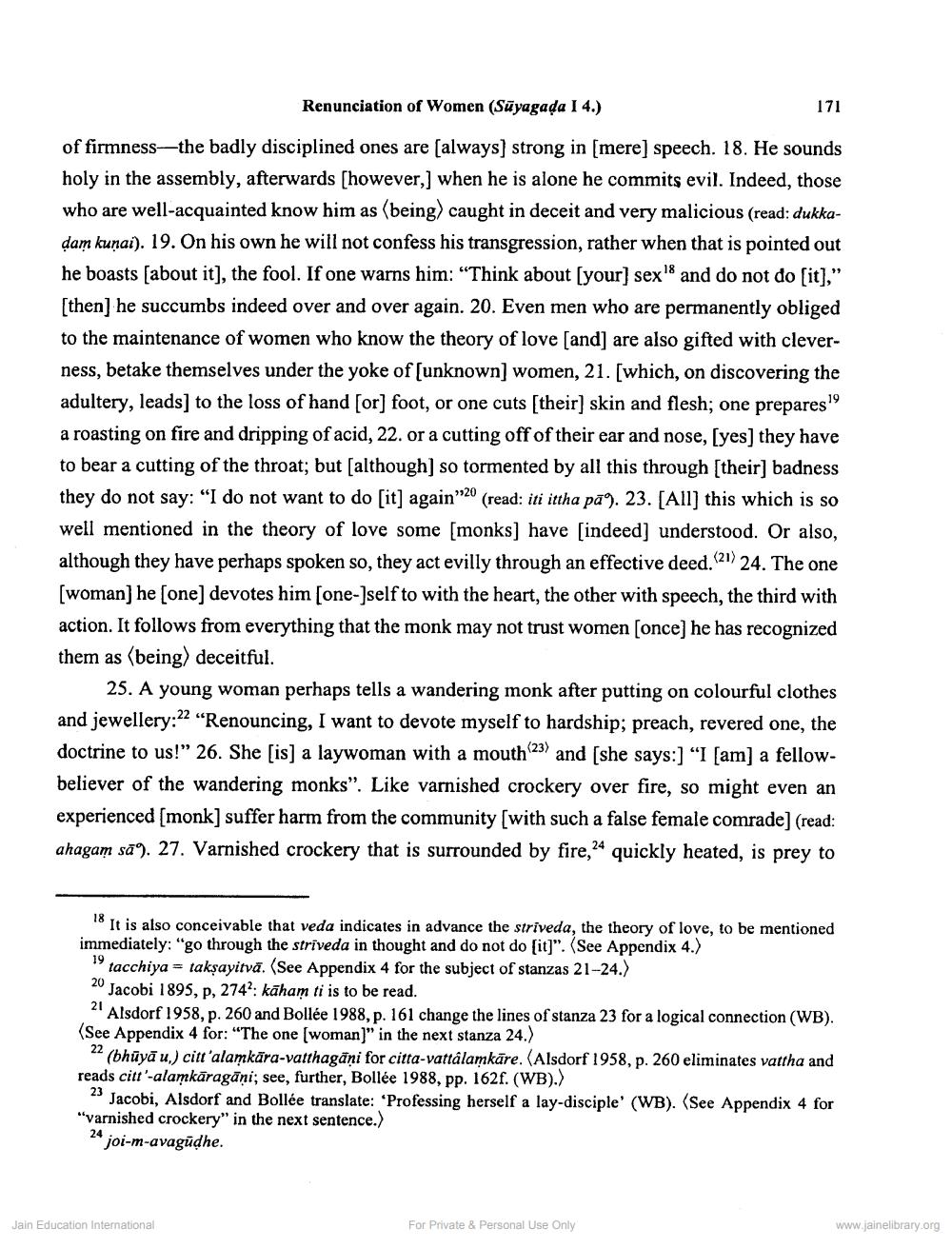________________
Renunciation of Women (Süyagada I 4.)
171
of firmness--the badly disciplined ones are always] strong in (mere) speech. 18. He sounds holy in the assembly, afterwards (however,] when he is alone he commits evil. Indeed, those who are well-acquainted know him as being caught in deceit and very malicious (read: dukkadam kuņai). 19. On his own he will not confess his transgression, rather when that is pointed out he boasts [about it), the fool. If one warns him: "Think about (your) sex and do not do [it]," [then] he succumbs indeed over and over again. 20. Even men who are permanently obliged to the maintenance of women who know the theory of love [and] are also gifted with cleverness, betake themselves under the yoke of (unknown] women, 21. [which, on discovering the adultery, leads) to the loss of hand (or) foot, or one cuts (their) skin and flesh; one prepares' a roasting on fire and dripping of acid, 22. or a cutting off of their ear and nose, (yes) they have to bear a cutting of the throat; but (although) so tormented by all this through (their) badness they do not say: "I do not want to do [it] again”20 (read: iti ittha pag. 23. [All] this which is so well mentioned in the theory of love some [monks] have [indeed] understood. Or also, although they have perhaps spoken so, they act evilly through an effective deed. (21) 24. The one (woman) he (one) devotes him (one-)self to with the heart, the other with speech, the third with action. It follows from everything that the monk may not trust women (once) he has recognized them as (being) deceitful.
25. A young woman perhaps tells a wandering monk after putting on colourful clothes and jewellery:22 “Renouncing, I want to devote myself to hardship; preach, revered one, the doctrine to us!" 26. She [is] a laywoman with a mouth 23) and (she says:) “I [am] a fellowbeliever of the wandering monks”. Like varnished crockery over fire, so might even an experienced (monk] suffer harm from the community (with such a false female comrade) (read: ahagam sā9. 27. Varnished crockery that is surrounded by fire,24 quickly heated, is prey to
18 It is also conceivable that veda indicates in advance the striveda, the theory of love, to be mentioned immediately: "go through the striveda in thought and do not do [it]". (See Appendix 4.)
" tacchiya = takşayitva. (See Appendix 4 for the subject of stanzas 21-24.) 20 Jacobi 1895, p, 274?: kāham ti is to be read.
? Alsdorf 1958, p. 260 and Bollée 1988, p. 161 change the lines of stanza 23 for a logical connection (WB). (See Appendix 4 for: "The one (woman)" in the next stanza 24.)
- (bhūyā u.) citt'alamkāra-vatthagāni for citta-vattálamkāre. (Alsdorf 1958, p. 260 eliminates vattha and reads citt'-alamkāragāni; see, further, Bollée 1988, pp. 162f. (WB).)
23 Jacobi, Alsdorf and Bollée translate: 'Professing herself a lay-disciple' (WB). (See Appendix 4 for "varnished crockery" in the next sentence.) 24 joi-m-avagūdhe.
Jain Education International
For Private & Personal Use Only
www.jainelibrary.org




